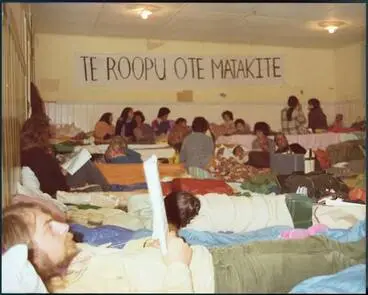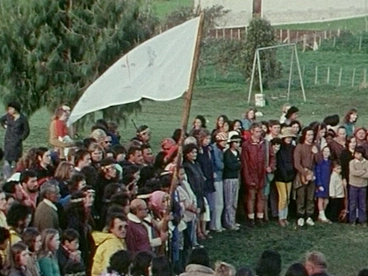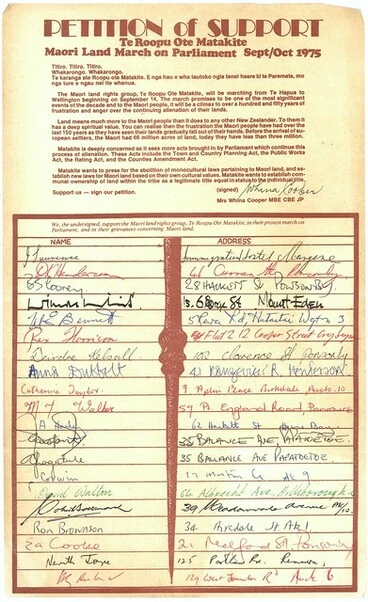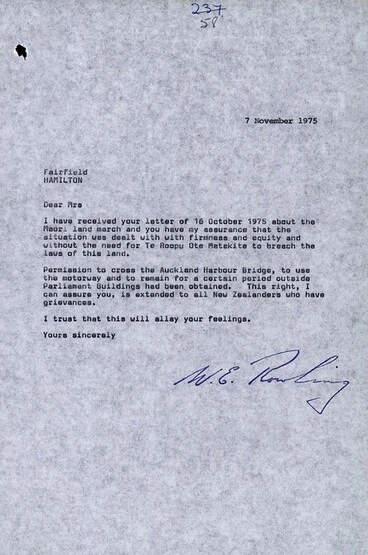1975 Land hikoi: Tuia Mātauranga Curiosity Card
A DigitalNZ Story by National Library Services to Schools
The 1975 hīkoi (known as the Māori Land March) in Hamilton, led by Tame Iti and Whina Cooper.
Tame Iti holding pou whenua, accompanied by Whina Cooper, leading Māori Land March along Hamilton street
Alexander Turnbull Library
WHAKATAUKĪ
"Manaaki whenua, Manaaki tangata, Haere whakamua."
"Care for the land, care for the people, Go forward."
Whina Cooper and her moko
Manatū Taonga, the Ministry for Culture and Heritage
1975 land march
Manatū Taonga, the Ministry for Culture and Heritage
Participants in Māori Land March walking down College Hill, Ponsonby, Auckland
Alexander Turnbull Library
BACKGROUND
In the early 1970s, growing Māori anger over land alienation led to activism. In the 1975 hīkoi (‘stepping out’), protesters marched from Northland to Wellington to ask the government to halt further losses of Māori land.
In the same year, the government set up the Waitangi Tribunal to investigate breaches of the Treaty of Waitangi that had been detrimental to Māori.
Source: 'Wellington region - New growth and attitudes: 1940–1975', URL: http://www.teara.govt.nz/en/photograph/13280/land-march, (Ministry for Culture and Heritage), (updated 1-August-2015)
Arrival in Wellington
Under drizzly skies, thousands of people crammed into the grounds of Parliament Buildings, Wellington, in October 1975, at the end of the historic Māori land march. Ngāpuhi leader Whina Cooper had led the march from Te Hāpua in the far north to protest against the continuing loss of Māori land. This action brought treaty issues to public attention more strongly than at any time since the 19th century.
Source: 'Treaty of Waitangi - Honouring the treaty – 1940 to 2000s’, URL: http://www.teara.govt.nz/en/photograph/36375/maori-land-march-1975, (Ministry for Culture and Heritage), (published 20-June-2012)
Whina Cooper
Ko Whina Cooper o Te Rarawa tēnei e kauhau ana ki te tira hīkoi whenua Māori i Kirikiriroa i te marama o Hepetema 1975. He roa ngā tau e whakapau kaha ana ia mō tana iwi me te iwi Māori whānui hoki. Ahakoa tana rongonui mō tana ārahi i te hīkoi whenua Māori, koia anō te perehitini o te Rōpū Wāhine Māori Toko i te Ora. I tōna makeretanga mai i te tūranga perehitini o te rōpū, ka whakatauria te ingoa o Te Whāea-o-te-motu ki runga ki a ia.
Source: ‘Kaumātua - Kaumātua me āna mahi', URL: http://www.teara.govt.nz/mi/kaumatua, (Ministry for Culture and Heritage), (published 5-May-2011)
Participants in Māori Land March at Ōtoko Pā
Alexander Turnbull Library
Land March
DigitalNZ
QUICK FACTS
- A leaflet handed out by the Land March protesters explained that: ‘Land is the very soul of a tribal people.’
- One of New Zealand’s most iconic 20th-century photographs shows Whina Cooper holding her grand-daughter’s hand, as she leaves Te Hapua on the Māori Land March.
- The Waitangi Tribunal was established in late 1975 in-part as a response to the Land March.
- After the 1975 Land March, a group of protesters remained and set up a "tent embassy" in Parliament grounds to remind the public about the Land March.
- During the Land March, some Pakeha expressed a view that New Zealand was one nation and that “we are all New Zealanders”. This dominant voice ignored bicultural obligations around Māori values, protest and the principles of the Treaty of Waitangi.
Māori land march, 1975
Manatū Taonga, the Ministry for Culture and Heritage
Māori land march, 1975
Manatū Taonga, the Ministry for Culture and Heritage
Te Matakite o Aotearoa - The Māori Land March
NZ On Screen
OTHER RESOURCES
1975 Land March — commemorating 40 years since the Land March.
1975 Maori Land March — photographs and documents held by Archives New Zealand associated with the 1975 Land March.
Ahuwhenua — Māori land and agriculture - including land ownership, confiscation, fragmentation, and solutions
Ahuwhenua — te mana whenua me te ahuwhenua Māori.
Dame Whina Cooper — Dame Whina Cooper, of Te Rarawa descent, was born in 1895 in northern Hokianga.
Whina Cooper leads land march to Parliament 13 October 1975 — New Zealand history events.
Māori Land March 1975 — here is a sheet of the actual petition that was delivered to parliament.
‘Not one more acre’ — the Māori Land March 40 years on exhibition.
Papatūānuku — ko Papatūānuku te whāea o ngā mea katoa o te ao.
Tame Iti — the man and the mana.
Te Matakite o Aotearoa — this film is a detailed chronicle of a key moment in the Māori renaissance: the 1975 Land March.
Te tango whenua — Māori land alienation.
Te tango whenua — he maha ngā take i riro atu ai ngā whenua o te Maori.
The Māori Land March — in early 1975, the idea of a ‘Māori Land March’ from Te Hapua in the far north to Parliament was discussed.
The Māori Land March — ko te pae tukutuku o Te Pūhikotuhi o Aotearoa.
Tūrangawaewae — ko tētahi o ngā āhuatanga, tikanga nui rawa atu i roto i te ao Māori, ko te tūrangawaewae.
Tūrangawaewae — a place to stand.
Whina Cooper — a biography of Whina Cooper.
Maori land march of 1975, Taranaki Street, Wellington
Alexander Turnbull Library
Arrival of the Maori land march on Parliament grounds 1975.
Museum of New Zealand Te Papa Tongarewa
Maoritanga - Scenes from Maori Life, Maori Land March.
Museum of New Zealand Te Papa Tongarewa
FERTILE QUESTIONS
- He aha a Ngāi Māori i porotēhi ai mō ō rātou whenua me ō rātou taonga?
- Why did Māori protest over their lands and taonga?
- He aha te take kei te whakaaro nuitia te whenua e te Māori?
- What would you like to change? How could you do this?
- What forms can power take?
- Why do people protest?
- What is your question?
Maori Land March. Protest, Parliament.
Museum of New Zealand Te Papa Tongarewa
Maoritanga - Scenes from Maori life. Maori Land March.
Museum of New Zealand Te Papa Tongarewa
Maoritanga - Scenes from Maori Life, Maori Land March.
Museum of New Zealand Te Papa Tongarewa
ADDITIONAL QUESTIONS
- How could you take action to change something?
- How can citizens and groups effect change in society?
- How much influence can an individual have in changing history?
- How can people express what they stand for? Or stand against?
- What is the difference between tino rangatiratanga and kāwanatanga?
Māori Land March 1975 - Petition Sheet
Manatū Taonga, the Ministry for Culture and Heritage
Heath, Eric Walmsley 1923-: Land March 4. [1975]
Alexander Turnbull Library
Māori Land March (1975) - Response to complaint by PM Bill Rowling
Archives New Zealand Te Rua Mahara o te Kāwanatanga
This story was curated and compiled by Te Puna Mātauranga o Aotearoa | National Library of New Zealand, Services to Schools staff, 2019.







